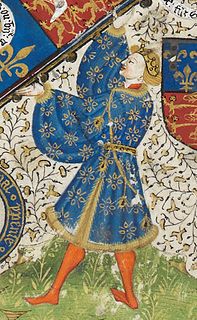Related Research Articles

Richard of York, 3rd Duke of York, also named Richard Plantagenet, was a leading English magnate, a great-grandson of King Edward III through his father, and a great-great-great-grandson of the same king through his mother. He inherited vast estates and served in various offices of state in Ireland, France, and England, a country he ultimately governed as Lord Protector during the madness of King Henry VI.

William Hastings, 1st Baron Hastings KG was an English nobleman. A loyal follower of the House of York during the Wars of the Roses, he became a close friend and one of the most important courtiers of King Edward IV, whom he served as Lord Chamberlain. At the time of Edward's death he was one of the most powerful and richest men in England. He was executed following accusations of treason by Edward's brother and ultimate successor, Richard III. The date of his death is disputed; early histories argued for a hasty execution on 13 June, while Clements R. Markham argues that he was executed one week after his arrest on 20 June 1483, and after a trial.

Robert Willoughby, 6th Baron Willoughby de Eresby was an English nobleman and military commander in the Hundred Years' War.

John de Vere, 12th Earl of Oxford, was the son of Richard de Vere, 11th Earl of Oxford, and his second wife, Alice Sergeaux (1386–1452). A Lancastrian loyalist during the latter part of his life, he was convicted of high treason and executed on Tower Hill on 26 February 1462.
The Sheriff is the oldest secular office under the Crown. Formerly the Sheriff was the principal law enforcement officer in the county but over the centuries most of the responsibilities associated with the post have been transferred elsewhere or are now defunct, so that its functions are now largely ceremonial. Under the provisions of the Local Government Act 1972, on 1 April 1974 the office previously known as Sheriff was retitled High Sheriff. The High Sheriff changes every March.
Sir John Norreys was a high ranking Lancastrian, and the head of the branch of the Norreys family who became prominent under the reign of the House of Tudor. He served as Keeper of the Wardrobe for King Henry VI of England.
Sir William Norreys was a famous Lancastrian soldier, and later an Esquire of the Body to King Edward IV.
Sir Walter Devereux of Bodenham and Weobley was a loyal supporter of Richard of York, 3rd Duke of York during the Wars of the Roses. He was Lord Chancellor of Ireland from 1449 to 1451.

Sir Walter Devereux, 5th Viscount Hereford, 2nd Baronet of Castle Bromwich, was an English politician who sat in the House of Commons at various times, between 1614 and 1624, before succeeding to the family Viscountcy in the peerage of England.
Sir Walter Beauchamp was an English lawyer and Speaker of the House of Commons of England between March and May 1416.
George Crichton, 1st Earl of Caithness, was a Scottish peer.
Sir William Bagot was a politician and administrator under Richard II.

Sir Robert Throckmorton of Coughton Court, Warwickshire, MP, KG was a distinguished English Tudor courtier. His public career was impeded by being a Roman Catholic.
Sir Simon Montford was an English Lord of several manors, who was executed for treason.
Sir Richard Manners of Garendon Park, Leicestershire, was an English politician.
Sir William Wigston was an English politician.
Sir William Flamville, of Aston Flamville, Leicestershire, was an English politician.
Sir Humphrey Stafford of Grafton in Worcestershire, was a prominent member of the fifteenth-century English gentry in Worcestershire, for which county he was Member of the English Parliament in 1415.
Sir Robert Digby PC(I) was an English courtier who owned an estate at Coleshill, Warwickshire. His marriage to Lettice FitzGerald, heir-general to the 11th Earl of Kildare, led him to spend his life litigating over her claims to the Kildare lands. He divided his time between local business in Warwickshire and in Ireland.
The Mountford family were a gentry family who held lands in Coleshill, Warwickshire during the late Middle Ages. They were involved in an inheritance dispute in 1452 which was caused by the disinheritance of a senior line, in favour of the sons of a second wife. The family was descended from Sir John Mountford.
References
- "MOUNTFORT (MONTFORT), William I (d.1452), of Coleshill in Arden, Warws". History of Parliament Online. Retrieved 4 September 2013.
This article includes a list of references, related reading or external links, but its sources remain unclear because it lacks inline citations .(May 2014) (Learn how and when to remove this template message) |